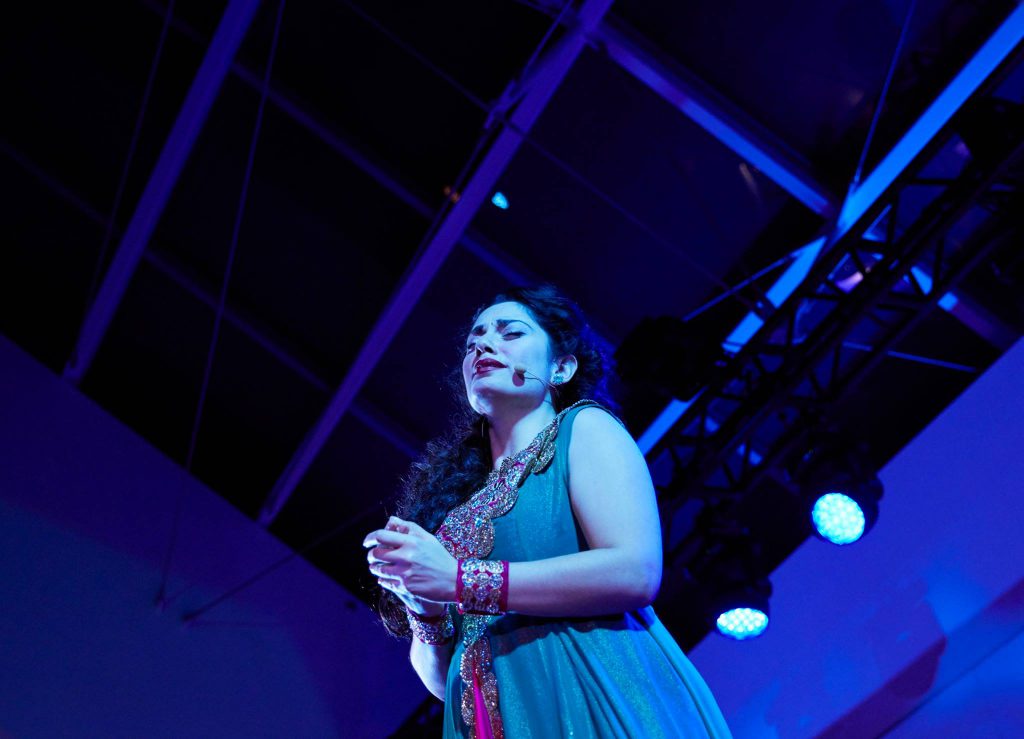A Conversation with Miriam Khalil
Miriam Khalil understands better than most the depth of experience that attends life in the Middle East. Curled up on an accommodating armchair in a mid-town meeting place, the versatile Toronto-based singer actor reflects on both the richness and perpetual half-hidden risk that characterized her early childhood.
“I moved from Damascus when I was seven. We were practicing Catholics. We would do parades in the street when it was Easter. Walk around with candles. Muslims and Christians attended my school. Everyone was encouraged to study there. I thought everything was fine even though there were incidents that pointed out it wasn’t. I had three older brothers. They went through a lot more than I did. My parents knew we weren’t allowed to say anything negative about the government. Then when we came to Canada in 1987, I suddenly heard my mother and father speaking not so positively about things there. As a child you grow up and you realize that your reality was so sheltered even from your own family.”
Ayre, Argentinian-born composer Osvaldo Golijov’s impassioned contemporary song cycle that opens the Royal Conservatory’s 21C Music Festival, occupies a place of particularly vibrant resonance for the venturesome Arab Canadian soprano. Spanning time from the Middle Ages until today, the crisp, 45-minute transcultural odyssey traces an imagined journey through history from Al-Andalus to Jerusalem and the West Bank by way of late 18th century feudal Sardinia. Texts, several largely transcribed verbatim from Ladino, the language of Spanish Sephardim, mesh and meld with fragments of poetry, chant and song written in Arabic, Hebrew, modern Spanish and an ancient eastern Mediterranean dialect. Music tumbles from humble homes and glowering castles, churches and synagogues and streets. Christians, Muslims and Jews occupy the same fundamental common geography of existence however fractured at times. With one prominent exception, an outpouring of exile verses by Palestinian national poet Mahmoud Darwish, Kun Li-Guitari Wataran Ayyuha Al-Maa (“Be a string, water, to my guitar”), the present largely exists as potent, strikingly tangible subtext.
“When I first heard Ayre, it was in 2008,” says Khalil. “It hit me like a boulder because, I remember, the conflict in the Middle East was ongoing and this is something my family and I have always talked about. So with this piece, when I saw all these languages and religions and connotations and cultures were in there, I thought, ‘This is a dream piece!’ I wanted to do it not because it’s political but because it’s everything I’ve always wanted to say.”
Khalil’s first point of contact with Ayre, Dawn Upshaw’s landmark 2005 CD, a gift from conductor friend and colleague Jamie Sommerville who had played horn on the original recording, set in motion a transformative set of professional and personal circumstances.
“Maybe it was hunch on Jamie’s part that I would connect to the piece,” muses Khalil. “I think it was fate.”
A remarkable chain of events began to build. In the wake of her historic internet broadcast of the national anthem in Arabic, came an invitation to Banff Centre for Arts and Creativity via faculty member Barry Shiffman who had heard Khalil sing in her heritage language as part of an earlier educational outreach project. Invited to appear in an all-Arabic program Shiffman had programmed in the Rockies in 2014, Khalil leapt at the chance particularly when told Osvaldo Golijov intended to present Ayre there after premiering it at Carnegie Hall .
“I tried not to let on how badly I wanted to do it.”
“When I finally met him later I was a nervous wreck. He asked me if I had ever heard of Fairuz. She’s Lebanese and one of the biggest Arabic stars. She’s in her eighties or nineties now and did a lot of live church recordings. My mom had one of the tapes and all Holy Week we’d listen to her. When he told me that’s what had inspired two of the songs in Ayre, (Wa Habibi —“My Love” and Aiini Taqtiru — “My eyes weep”) I said, ‘Well, I know the sounds you’re looking for’.”
Revived at Banff in 2016 with repeat performances in Ottawa and Toronto (live recorded for CD) followed by subsequent offerings in Buenos Aires, Rockport Massachusetts and Victoria, Ayre has rapidly developed into something of a signature piece for Khalil, a legacy she both respects and treasures. The responsibility for delivering Golijov’s message of tolerance and understanding based on a common humanity with clarity and grace lies at the core of her vision as an artist.
“I think it’s very important to use whatever platform you have to inspire change or a positive outlook on what the world should be and could be by enacting rather than preaching. For me, unity is the big thing. I just want people to know we all want the same thing at the end of the day. We all want safety and security. We all want love. These are the things we need to focus on.”
Ayre is a work that speaks across the ages, a call from the past, an urgent plea from the present populated by a cast of intensely affecting voices all residing in a single soloist. The vibrancy of human expression accented by loss and remembrance, pride and passion, powerful and all encompassing strikes straight to the heart.
Miriam Khalil has made the piece her own.
Ayre, written and arranged by Osvaldo Golijov, will be presented at Koerner Hall, Saturday, January 11, 8:00 PM. Three additional works by the composer, Mariel, K’vakarat and Tenebrae, are also featured.
* * *
Above: Miriam Khalil in Ayre, Against the Grain Theatre 2016. Photo by Darryl Block.


